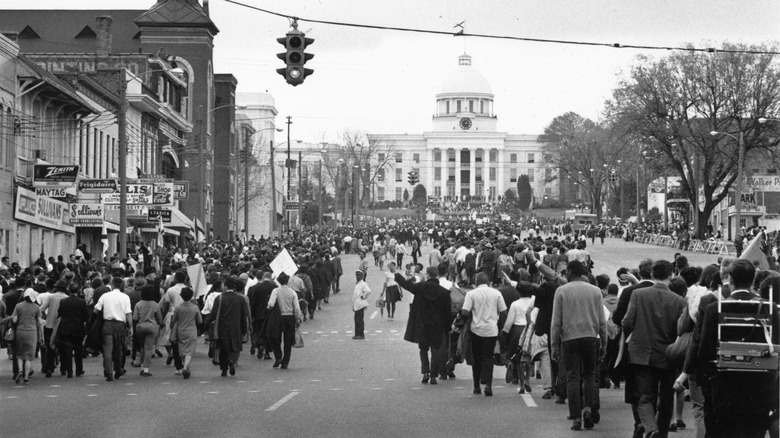How Historically Accurate Is The Movie Selma?
The movie "Selma" was a well-received bit of cinema zeroing in on a very specific time in beloved civil rights leader Martin Luther King Jr.'s life (via IMDb). The movie's focus was the march King and his followers did in the name of voter rights. The historic demonstration took place in 1965 when civil rights advocates made their way from Selma, Alabama, to Montgomery, Alabama, a 54-mile stretch.
A lot can happen over the course of three months and 54 miles when you're leading a revolutionary movement. As such, capturing that pivotal moment and transferring it from real to reel is no small feat. Every shot must be meticulously combed over and checked for historical accuracy in regard to setting, characterization, timeline of events, wardrobe, and much more. So, how did 42-year-old Compton native and "Selma" director Ava DuVernay fair regarding historical accuracy in film? According to experts, fairly well. In fact, "Selma" scores exceptionally high for accuracy (via The Independent).
Critics praise Selma's historical accuracy
As you might imagine, basing a movie on a true story still requires a bit of creative tweaking. Real life doesn't move in the same way that cinema does. Real life is a series of seemingly mundane activities happening in an unorganized, disconnected manner. Movie plots, on the other hand, must always move forward, eliminating awkward moments of silence and introspection and keeping the audience in a perpetual state of entertainment.
Yet, when a film is rooted in real-life events, it shoulders the responsibility of fostering the audience's need for escapism and society's right to the preservation of truth. Many films fall short of this goal. For example, The Independent notes that Alan Turing's Oscar award-winning film "The Imitation Game" scored 41.4% for its historical accuracy. "The Wolf of Wall Street," starring Leonardo DiCaprio, racked up a percentage of 74.6.
Dee Lockett of Slate took her time sifting through the finite details of "Selma" in order to challenge or prove its historical accuracy. What she found was an uncanny resemblance to real events like Bloody Sunday and real-life relationships like the one that existed between Martin Luther King Jr. and his wife Coretta Scott King. Director DuVernay claims to have relied on media imagery, interviews, reports, and newspaper clippings to recreate these groundbreaking historical events and bring them back to life onscreen.

